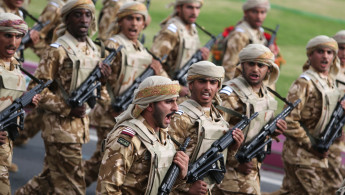Qatar withdraws troops from peacekeeping mission on Djibouti-Eritrea border
Qatar said on Wednesday it had pulled all of its troops from the border of Djibouti and Eritrea, East African nations that have a long-running territorial dispute which Doha had helped mediate.
Qatar offered no explanation for the move, though it comes amid a diplomatic dispute with other Arab nations that have cut diplomatic ties and now are trying to isolate Qatar from the rest of the world.
While the dispute hasn't escalated to a military confrontation, Qatar's military is dwarfed by neighboring Saudi Arabia and the United Arab Emirates, two of its biggest opponents in the crisis.
The United Arab Emirates' ambassador to the United States said on Tuesday there was no military aspect to steps taken by Arab powers against Qatar, which they accuse of supporting terrorism, but that further economic pressure could be applied.
"There is absolutely no military component to anything that we are doing," UAE Ambassador Yousef Al Otaiba told reporters in Washington.
The 450 Qatari troops controlled a mountainous border crossing between Eritrea and Djibouti, said Nasredin Ali, a spokesman for Eritrea's biggest armed group, known as the Red Sea Afar Democratic Organization. Eritrean forces moved in after the troops departed, Ali said.
Eritrea's top diplomat to the African Union, Araya Desta, told The Associated Press the move came after Eritrea cut diplomatic ties to Qatar. However, Desta said his country wanted no confrontation with Djibouti.
"We don't want to take any of Djibouti's land," Araya said. "The last time we had some skirmishes. It was unnecessary."
Doha mediated the conflict between the two countries in 2010. Gulf nations have stationed troops in both East African countries, using it as a jumping-off point for the ongoing Saudi-led war in Yemen.
Saudi Arabia, Egypt, the United Arab Emirates and Bahrain accused Qatar of supporting terrorism and severed ties last week. Qatar denies the allegations, and has stressed the measures are meant to force it to shift its independent foreign policy.





 Follow the Middle East's top stories in English at The New Arab on Google News
Follow the Middle East's top stories in English at The New Arab on Google News
![The UAE is widely suspected of arming the RSF militia [Getty]](/sites/default/files/styles/image_330x185/public/2024-11/GettyImages-472529908.jpg?h=69f2b9d0&itok=Yauw3YTG)
![Netanyahu furiously denounced the ICC [Getty]](/sites/default/files/styles/image_330x185/public/2024-11/GettyImages-2169352575.jpg?h=199d8c1f&itok=-vRiruf5)
![Both Hamas and the Palestinian Authority welcomed the ICC arrest warrants [Getty]](/sites/default/files/styles/image_330x185/public/2024-11/GettyImages-2178351173.jpg?h=199d8c1f&itok=TV858iVg)